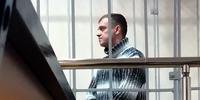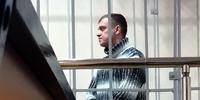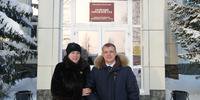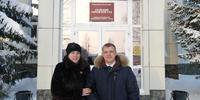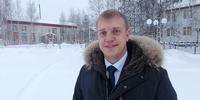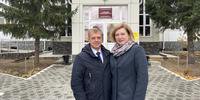The Case of Sazonov in Uray
Filter
- #
The Investigative Committee of the Russian Federation for the Khanty-Mansi Autonomous Okrug-Yugra initiates a criminal case for faith under Articles 282.2 (1), 282.2 (2); religious affiliation is interpreted as "organization and participation in the activities of an extremist organization" (with reference to the court decision to liquidate the local organization of Jehovah's Witnesses). An innocent victim of law enforcement officers is Andrei Sazonov (born in 1980).
- #
Authorities are conducting searches in 8 houses of residents of the city of Urai (Khanty-Mansi Autonomous Okrug). All of them are peaceful believers. Andrey Sazonov, the first deputy general director of the Urayteploenergia enterprise, is taken into custody. He is charged with committing a crime under Part 1 of Article 282.2 of the Criminal Code of the Russian Federation. A search is being conducted at the workplace and in Andrey Sazonov's personal car.
- #
- #
Arkady Koba, judge of the Khanty-Mansiysk District Court, sends Andrey Sazonov to a pre-trial detention center for 55 days, until March 31, 2019.
- #
- #
The Court of Appeal reduces the period of detention of the suspect until March 1, 2019, the case is sent for a new trial.
- #
The Khanty-Mansiysk District Court denies the Investigative Committee of the Russian Federation the detention of Andrey Sazonov and issues an order to immediately release him in the courtroom and transfer him to house arrest until March 31, 2019. He spent 20 days in SIZO-1 in the Tyumen region.
- #
- #
Deputy Head of the Department - Head of the First Investigation Department of the Department for the Investigation of Especially Important Cases of the Investigative Directorate of the Investigative Committee of the Russian Federation for the Khanty-Mansi Autonomous Okrug-Yugra M. Kartoev petitions for the extension of Andrey Sazonov's preventive measure until September 30, 2019. However, the Court of Appeal of Khanty-Mansiysk releases the accused from house arrest, under which he spent 209 days with a bracelet on his leg. The Court considers that the decision of the court of first instance is biased and contradicts several articles of the Code of Criminal Procedure of the Russian Federation. There is no evidence that Sazonov is obstructing the investigation or plans to do so in the future. The court also takes into account Andrey's state of health, his social adaptation, the availability of his own housing and family. The measure of restraint has been replaced by a ban on certain actions. The believer is forbidden to communicate with "people related to the criminal case", send and receive correspondence, use the Internet and telephone according to the circumstances of the criminal case.
- #
- #
The Urai City Court of the Khanty-Mansi Autonomous Okrug-Yugra satisfies the petition of the head of the Investigative Committee for the Khanty-Mansi Autonomous Okrug-Yugra Balezin S.N. and seizes the car and land plot of Andrey Sazonov.
- #
Andrey Sazonov is charged with committing a crime under Part 1 of Article 282.1. The investigation adds another part 1 of article 282.3 of the Criminal Code of the Russian Federation.
- #
Criminal case No. 11902711019033037 against unidentified persons on the grounds of a crime under Part 2 of Article 282.2 of the Criminal Code of the Russian Federation stands out from the materials of the criminal case.
- #
The court of the Khanty-Mansi Autonomous Okrug-Yugra cancels the decision of the lower court of January 16, 2020 on the seizure of the property of Andrey Sazonov.
- #
The prosecutor does not approve the indictment against Andrey Sazonov and returns it to the investigator.
- #
Andrey Sazonov is charged with committing a crime under Part 1 of Article 282.1, Part 1 of Article 282.3 of the Criminal Code of the Russian Federation.
- #
Senior investigator E. S. Komissarova applies to the court for setting a deadline for familiarization with the materials of the criminal case until April 16, 2020. The judge of the Urai City Court of the Khanty-Mansi Autonomous Okrug-Yugra Orlova G.K., partially satisfying the petition of the investigator, sets the deadline until April 17, 2020.
- #
The accused is familiar with the materials of the criminal case.
- #
The senior investigator of the Urai Interdistrict Investigative Directorate of the Investigative Committee of the Russian Federation for the Khanty-Mansi Autonomous Okrug-Yugra, Major of Justice E. S. Komissarova, sends the criminal case with the indictment to the prosecutor.
- #
Prosecutor of the city of Uray, Counselor of Justice A. P. Yakimenko approves the indictment in the case of Andrei Sazonov. The Investigative Committee is distributing a press release stating that the case will soon be referred to the court for consideration on the merits. The accused faces a sentence of up to 15 years in prison.
- #
Judge of the Urai City Court of the Khanty-Mansi Autonomous Okrug-Yugra Ilnur Gilmanov leaves unchanged the measure of restraint in the form of a ban on certain actions for Andrei Sazonov. The judge finds no grounds for holding a preliminary hearing in the case and schedules the first hearing on the merits for June 1, 2020. The case will be considered by Judge Gilmanov alone and behind closed doors. As an excuse for such a significant restriction of the principle of publicity and openness of legal proceedings, Judge Ilnur Gilmanov cites his fear that an open hearing of the case "may lead to the disclosure of state or other secrets protected by federal law," as well as "damage the interests of society and the state protected by federal law."
- #
Urai City Court of the Khanty-Mansiysk Autonomous Okrug – Ugra. Before the start of the consideration of the case on the merits, the lawyer by appointment declares self-recusal. Judge Ilnur Gilmanov postpones subsequent court hearings to June 22 and 23.
- #
Hearings in the Urai City Court are held behind closed doors. Only Andrey Sazonov is allowed to attend the meetings. Judge Ilnur Gilmanov grants the believer's request for self-defense, and the state lawyer is released. For the second time, the judge rejects the believer's petition for an open court hearing.
Judge Gilmanov interrogates prosecution witnesses. Their testimonies do not confirm the accusations made by the prosecutor against Andrei Sazonov. When asked by the prosecutor about the interpretation of the Bible by Jehovah's Witnesses, the elderly woman replied: "What is written in the Bible is what was read. And in general, I did not notice anything bad. All good, well-mannered people.
- #
Judge Gilmanov continues to question prosecution witnesses. Some witnesses note that the interrogation protocols of the investigator contain wording that they did not say. In response to a request from the prosecutor to comment on the inconsistency of the testimony, one of the witnesses replied: "I did not say what was written there at all. I told the investigator the same thing I told you. She wrote, but I didn't read it and just signed. I'm used to trusting people!" In just 2 days, 6 prosecution witnesses were questioned. The next meeting will be held on September 3, 2020 at 9:00 a.m. Other prosecution witnesses are scheduled to be examined.
- #
The interrogation of prosecution witnesses continues behind closed doors in the Urai City Court. They characterize Andrey Sazonov positively. In particular, one of them notes that she likes the teachings of Jehovah's Witnesses and their highly moral Christian way of life. At the next hearing, it is planned to continue the questioning of prosecution witnesses.
- #
The questioning of prosecution witnesses is ongoing. One of them had previously recorded conversations with Jehovah's Witnesses and passed them on to an investigator. Another witness during the interrogation characterizes the defendant as a good and talented person.
- #
The defendant's neighbors are being interrogated. Both witnesses state that they do not know Sazonov and cannot confirm that he committed anything illegal.
- #
The next witness, a police officer, says that during the operational-search activities he did not hear from Andrei Sazonov calls for violence, the overthrow of the constitutional order of the Russian Federation or discrimination against people on the basis of religious religion. The witness also admits that he has not read the decision of the Supreme Court of the Russian Federation to liquidate the religious organization of Jehovah's Witnesses in Russia and cannot say what exactly was banned.
- #
A witness is being questioned who, at the request of police officers, videotaped Jehovah's Witnesses services on several occasions. He notes that the believers were friendly to him. At these meetings, the witness did not hear the defendant propagate the exclusivity and superiority of the religion of Jehovah's Witnesses.
- #
The prosecutor continues to read out the materials of the case, and also requests the examination of material evidence. He believes that the defendant's belongings seized during the search prove that he belongs to Jehovah's Witnesses, which the believer does not hide.
- #
Videos of worship services of Jehovah's Witnesses are viewed. One of the videos discusses how to lead a decent lifestyle: be able to forgive, wisely approach the choice of clothing and entertainment. At the same time, it is impossible to distinguish the faces of those present on the video.
- #
The viewing of video recordings of worship services and listening to audio files from the case materials continues. In the video, the faces of the people are still not visible, but the promptings to act in accordance with the Christian noms of morality and morality are heard; It tells how to protect yourself and your children from immorality, how to learn to forgive and respect the feelings of others.
- #
The hearing is again held behind closed doors. At the request of Andrei Sazonov, four witnesses from the defense are interrogated - a colleague at work, mother-in-law, daughter and wife of the defendant.
Sazonov's colleague characterizes him positively and does not confirm any of the charges.
Sazonov's relatives speak of him as a caring husband, father and son-in-law. According to witnesses, the defendant has certificates and letters of thanks from the city authorities, he is respected by colleagues and neighbors.
Andrei Sazonov filed three motions to declare some materials of the criminal case inadmissible, but the court rejected them.
- #
Recordings of conversations between three men discussing Bible teachings are tapped at the hearing. Andrey Sazonov's voice is not on the recording.
- #
The state prosecutor shows the court videos, photographs of the oceanarium, people in the Turkish resort, sights of Tashkent, as well as illustrations that the prosecutor interprets as images of biblical scenes.
In his testimony, the defendant reports that he does not admit guilt, does not agree with the accusation, the essence of the charge is not clear to him, since he is an ordinary believer, and the Supreme Court of Russia did not ban the religion of Jehovah's Witnesses. He stresses that he has nothing to do with extremism or the organization of legal entities, but practices his religion in a legal manner accessible to citizens of the Russian Federation.
- #
The judge rejects the defendant's request for a public hearing. The meeting continues behind closed doors.
5 witnesses from the defense are being interrogated: 2 colleagues of Andrey, his acquaintance and father-in-law, as well as the deputy director for educational work at the school where the defendant's children study.
All witnesses for the defense say that the defendant is a believer, a Jehovah's Witness, has good qualities, does not create conflicts, and has never called for the severance of family relations. They have never heard from the defendant negative statements about persons of other faiths and state authorities, as well as calls to undermine the foundations of the constitutional order and state security, or any extremist statements.
The defendant and his family have a good reputation. The deputy director for educational work at the school where the Sazonov children study characterizes Andrey exclusively on the positive side, as a kind, sincere, open, sympathetic person.
Witnesses for the defense confirm that Sazonov not only did not incite the rupture of family relations, but, on the contrary, always encouraged others to preserve and strengthen family ties.
Andrey's father-in-law says that different religious views do not prevent them from being on good terms. He mentions that the defendant was awarded diplomas from the city administration, as well as from the management of the enterprise, where he has been working for many years.
Employees at work characterize Sazonov as a conscientious, kind and non-conflict person, a responsible employee and a reasonable leader who is always ready to help.
All defense witnesses are surprised and upset that a criminal case has been opened against Andrey.
- #
4 more defense witnesses are being questioned in court. Andrey Sazonov's mother-in-law characterizes him as a well-mannered, intelligent, competent, sociable person. She says that he treats his wife with love, brings up children in kindness, and they love him. She also reports that she has never heard calls from the defendant to refuse medical care, including emergency care.
The wife speaks of Sazonov as a good husband, the economic head of the family, a caring father, always ready to help.
- #
The next closed meeting is held. Andrey Sazonov files 6 motions to exclude inadmissible evidence. The defense announces petitions for the appointment of comprehensive religious and linguistic examinations. Sazonov draws attention to the conclusions of experts, who pointed to the absence of extremism in the case materials sent for examination.
- #
The prosecutor requests a fine of 800,000 rubles for Sazonov under Part 1 of Article 282.2 of the Criminal Code of the Russian Federation (organization of the activities of an extremist association) and 700,000 rubles under Part 1 of Article 282.3 of the Criminal Code of the Russian Federation (financing the activities of an extremist association). The total amount of the fine is 1,500,000 rubles.
The last word of the defendant Andrey Sazonov in Urai - #
The announcement of the verdict is postponed until December 24.
- #
Judge of the Urai City Court of the Khanty-Mansi Autonomous Okrug - Ugra Ilnur Gilmanov finds Andrei Sazonov guilty and sentences him to a fine of 500 thousand rubles.
- #
Consideration of the appeal was postponed because the state prosecutor did not familiarize himself with the additions to the appeal.
- #
The court of the Khanty-Mansiysk Autonomous Okrug-Ugra cancels the conviction and sends the case for a new trial to the Urai City Court in a different composition of the court.
- #
- #
The criminal case against Andrey Sazonov is again submitted to the Urai City Court. This time it was assigned to Judge Igor Pospelov.
- #
The court is questioning five witnesses for the prosecution. The former director of the defendant characterizes Sazonov only on the good side, notes that he has an exceptionally positive reputation among other employees. According to the prosecution witness, Sazonov regularly took part in subbotniks, he was repeatedly encouraged by diplomas and letters of thanks from the head of the city and from the City Duma.
Thanks to a responsible and qualified attitude to work, the director appointed Sazonov as his deputy. He notes that he knew from the very beginning that Sazonov was one of Jehovah's Witnesses, but he never heard or saw from the defendant calls and actions aimed at inciting violence, hatred, enmity on religious grounds, as well as calls for the overthrow of the constitutional order and the rupture of family relations.
The former chief reports that two investigators from Khanty-Mansiysk came to him with a demand that he change his testimony and denigrate Sazonov. But he refused to do so.
The second witness for the prosecution characterizes Sazonov as a positive person. He says that he does not consider Jehovah's Witnesses to be extremists, since they, on the contrary, reject violence and advocate the maintenance of family values. The witness also reports that the investigation pressured him, threatening that his mother, who was one of Jehovah's Witnesses, would be imprisoned if he did not give the necessary testimony to the investigation.
The rest of the prosecution witnesses report that they do not know Sazonov.
- #
The hearing is being held behind closed doors. 7 witnesses are summoned to the court for questioning. Some of them claim that their testimony obtained during the preliminary investigation was falsified.
The neighbor of the defendant's relatives is interrogated first. She is familiar with him and speaks positively about both her neighbors and Sazonov. The woman reports that she has never heard that the defendant called for violence, the overthrow of the constitutional order, hatred or enmity.
Detective Chugunov, a law enforcement officer who in 2017-2018 was collecting information about the activities of Jehovah's Witnesses in Urai, is being interrogated. He formed his idea of the believers, including the defendant, on the basis of the words of two men who stated that they had once attended services of Jehovah's Witnesses.
Further, the court interrogates a woman who until 2021 worked in the city administration with non-profit religious organizations. From 2011 to 2017, she attended annual services of Jehovah's Witnesses. She says that families with children came there, and life issues were discussed there. She had never seen any documents about who organized such services. No one has ever called upon her to make monetary donations or join any religious organization.
The next witness - a woman - reports that she sees Andrei Sazonov for the second time in his life (the first time was at the last court hearing) and does not know him. She says that she once attended a service of Jehovah's Witnesses, this was until 2017. There were no calls for hatred or violence, she said: "People read the Bible, sang songs, prayed." The witness confirms that no one asked her to donate money at the service. She did not see the defendant there. When the state prosecutor reads out her opposite preliminary testimony, the woman declares that she does not confirm them: "I did not say these words to the investigator. I did not get acquainted with the protocol, the investigator read it to me. I signed it because I trusted the investigator."
Further, two more people are summoned for interrogation. The man says that he is not familiar with the defendant, he saw him only at the last court hearing and on TV in connection with Sazonov's speech by the nature of his professional activity. The woman also does not know Sazonov, she only saw him on the street several times. She confirms that she has not heard any calls from him to overthrow the government, disobey the laws of the state or break family ties. Sazonov did not offer her to make monetary donations. She also says that Sazonova learned about her religion from an investigator. She did not have this information before the interrogation.
The last witness for the prosecution says that he knows a religious group of Jehovah's Witnesses in a neighboring town, and heard about believers in Urai only from his acquaintance. The witness himself was never present at the services in Urai, and he cannot say anything about Sazonov's role. The man confirms that believers can worship God without a legal entity. He did not know whether there had ever been a local religious organization of Jehovah's Witnesses in Urai. He says that he has not heard from the defendant negative statements about representatives of other religions or the state.
- #
The court interrogates a witness for the prosecution, who admits that she does not know Sazonov. The second witness for the prosecution stopped attending Jehovah's Witnesses' services back in 2016 before their legal entities were banned. She reports that she has never heard from Sazonov or at the services themselves any calls to overthrow the constitutional order, to incite hatred on the basis of religious hatred and enmity. He characterizes the defendant as a decent person and an exemplary family man. The witness claims that the investigation distorted her testimony given during the preliminary investigation.
- #
The court session is held behind closed doors. The judge rejects the prosecutor's request to read out the testimony of the deceased witness, whom the prosecution planned to use as a classified witness.
The prosecutor reads out the written materials of the case (volumes 1 to 17). Due to the fact that the state prosecutor is not ready to name the time, transactions and amounts that would confirm the charges brought against Sazonov, he refuses to study bank statements.
- #
A prosecution witness who had previously attended Jehovah's Witnesses' services and secretly made audio and video recordings that he passed on to the investigation is being questioned. According to him, Sazonov did not make statements inciting enmity, hatred and violence, did not encourage participation in political and military conflicts, and did not call for refusing to receive education or forcing any of Jehovah's Witnesses to attend services and give donations.
During the interrogation, the witness gives contradictory answers to the same questions of the prosecution and the defense. During the two hours of interrogation, the witness did not say anything specific about the defendant's activities in relation to the charges.
- #
A prosecution witness shall be questioned at the next closed session. The man says that until 2017 he was at the services of Jehovah's Witnesses 3-4 times, and there he met the defendant and other believers. After 2017, he attended several more worship services of Jehovah's Witnesses, which he recorded on video on behalf of the police. The fact that the defendant organized worship services was, according to the witness, only his impression.
The man describes the defendant as a friendly, sympathetic person and a good family man. The witness did not hear any calls for religious hatred, discrimination, enmity or violence from Sazonov. According to him, the believer did not promote the exclusivity and superiority of the religion of Jehovah's Witnesses. In addition, he did not hear from the believer calls to undermine the constitutional order, non-observance of the laws of the state, refusal to pay taxes and education. He adds that there were no such statements at the services either, on the contrary, they quoted and discussed biblical texts, encouraged to lead a healthy lifestyle.
- #
At a closed meeting, material evidence is examined and video recordings with the results of the MPA are viewed.
- #
Interrogation of prosecution witnesses, one of whom attended the services of Jehovah's Witnesses, and the second is not personally acquainted with Andrei Sazonov.
- #
The hearing is still held behind closed doors. The court rejects two motions to declare inadmissible evidence of expert research.
The defendant files a motion for the admission of written evidence (the decision of the ECHR in the case of "LRO "Taganrog" and others v. the Russian Federation"). The court satisfies him.
Interrogation of 6 defense witnesses, including acquaintances and colleagues of Sazonov. All of them say that the defendant has good qualities, does not create conflicts, never called for the severance of family relations, did not oppose state authorities, local self-government bodies. According to witnesses, the believer and his family have a good reputation.
- #
In a closed session, the judge satisfies one of Sazonov's petitions filed earlier, and recognizes as inadmissible evidence a number of documents relating to the search of his home. Sazonov is filing four more motions to declare certain case materials inadmissible.
The defense announces the conclusions of comprehensive religious and linguistic examinations carried out at the request of a lawyer. Sazonov draws the court's attention to the fact that the experts did not find any extremist statements in the materials under study.
- #
The judge rejects all the petitions of Andrey Sazonov, which were stated at the last court session.
- #
The court attaches to the case file documents from the Federal Penitentiary Service confirming that Sazonov did not violate the regime as a measure of restraint. The believer files a petition to declare several more materials of the case inadmissible.
- #
The court rejects Sazonov's petitions for the publicity of the trial, as well as for the recognition of some evidence as inadmissible.
At the request of the defendant, material evidence seized during a search at his workplace and place of residence shall be examined. Among them are greeting cards, children's drawings and the Bible in the Synodal translation.
- #
Andrey Sazonov reads out his affidavit. He pleads not guilty and notes that the case file does not contain a single piece of evidence that he committed extremist actions.
- #
The prosecutor is requesting a large fine for Andrey Sazonov: 800,000 rubles under Part 1 of Article 282.2 of the Criminal Code of the Russian Federation, and 700,000 rubles under Part 1 of Article 282.3 of the Criminal Code of the Russian Federation. Given the period of Sazonov's imprisonment and house arrest, the state prosecutor asks to reduce the total amount to 1,300,000 rubles.
Andrey takes the lead.
- #
Andrey Sazonov gives his last word.
Andrey Sazonov's last word in Urai - #
- #
- #
The materials of the criminal case of Andrey Sazonov for the third time are received by the Urai City Court of the Khanty-Mansi Autonomous Okrug - Yugra. It will be considered by judge Viktor Yaryshev.
- #
Prosecutor Igor Menshikov appeals to the Seventh Court of Cassation of General Jurisdiction. He requests that the Sazonov case be sent for a new appeal hearing.
- #
The court session was postponed for an indefinite period until the decision of the cassation instance is made.
- #
Ruslan Mukhametov, judge of the Seventh Cassation Court of General Jurisdiction, refuses to transfer the cassation submission to the prosecutor's office for consideration, as he did not find any procedural errors.
- #
The prosecutor reads out the charge, the defendant expresses his attitude towards him.
Two prosecution witnesses are being questioned. One of them is not personally acquainted with Andrey Sazonov. The second witness, the defendant's former superior, repeats the testimony he gave during the previous trial and gives an extremely positive characterization of his subordinate and his family.
- #
The woman, who is a witness for the prosecution, claims that she does not know Andrey Sazonov. Another witness, operative Chugunov, who participated in the ORM against Jehovah's Witnesses in Uray, admits that he has never heard statements of an extremist nature from the defendant. A third witness states that he testified under duress: he was threatened that his mother would go to prison. The wording used in the protocol was suggested to him by the investigator.
- #
Four prosecution witnesses are being questioned, three of whom are not acquainted with Andrey Sazonov. A woman who used to attend meetings for worship indicates that the testimony she gave during the investigation is not true.
- #
The next prosecution witness is being questioned via videoconferencing, who claims that in 2017 he saw Andrey Sazonov talking to people on biblical topics. At the same time, a witness cannot identify a believer in the courtroom.
- #
Prosecution witness Artem Demidov, who conducted covert video filming of meetings for worship, characterizes the defendant as a sympathetic, helpful person, an athlete, and also adds: "You are a super-person, you should be looked up to!"
- #
A prosecution witness who previously attended meetings for worship of Jehovah's Witnesses is being questioned via videoconferencing. He gives a positive characterization of the defendant and says that Andrei Sazonov is not associated with extremism. In his testimony, he says that Jehovah's Witnesses encourage to lead a healthy lifestyle, do not smoke, do not abuse alcohol, and go in for sports.
- #
Witnesses for the defense, who have known Andrey Sazonov for many years, are being interrogated. They describe him positively: they note his conscientiousness, intelligence, absence of bad habits and good relations with others.
One of them says: "Andrey is a devoted, loyal and kind person who will support you in any difficult situation."
Another witness, a former city deputy head, emphasizes that the defendant's religious views did not harm working relations, and local government agencies treated Sazonov with respect.
- #
Andrey Sazonov appears in court with a written testimony. He pleads not guilty and claims that the case materials do not contain evidence of his participation in extremism.
- #
The prosecutor requests a fine of 1.3 million rubles for Andrey Sazonov. At the same time, the prosecutor notes that the defendant is described as a good family man, a trusted leader, and a competent specialist.
During the closing arguments, the believer says: "Neither the preliminary investigation nor the judicial investigation have established a single fact confirming my guilt. On the contrary, the case materials testify to my complete innocence."
Sazonov also refers to case law application in the Russian Federation, in particular, the example of the acquittal in the case of fellow believer Kirill Gushchin, and the decision of the Plenum of the RF Supreme Court, according to which participating in religious rites, reading and distributing religious literature is exercising the constitutional right to freedom of conscience and religion.
Whereas 17 people are allowed to attend the hearing, another 5 are waiting outside.
- #
Andrey Sazonov presents his closing arguments and makes his final statement. Among those gathered to support the believer is his daughter, who traveled 1000 kilometers.


The Final Statement of Defendant Andrey Sazonov in Uray - #

